Imagine a world where you could share about your mental health challenges with your boss and coworkers, and not worry about side glances, or worse, workplace discrimination, afterward. Where sharing led to compassion and support and brought your team closer together. Where the words “career-limiting move” never crossed your mind. Where you could safely be you.

We live in a culture that has engrained some pretty whack-ass notions of what emotional strength, fragility and success look like. Even when it doesn’t serve us, it often feels less risky to pretend everything is fine, hide what’s hurting us and push through. Mental health is an awkward subject in the workplace.
An organization called The Stability Network is shifting the narrative. It sends out speakers who live with mental health conditions to tell their stories in workplaces around the world, and to demonstrate that it’s possible to have an episode, recover and continue to thrive in all manners and ways. TSN’s tag line says it all: Changing the way we talk about mental health, one story at a time.
Twenty years ago, I took a five-week medical leave from my job because of depression. My immediate teammates were amazingly supportive, but I remember feeling anxious about what the rest of the office thought about my absence, and whether I would retain the respect of my peers when I returned.
On my first day back, I heard many kind greetings, but the reason for my absence was carefully avoided. You know how when someone returns after a surgery or a heart attack, everyone has a similar story to tell? Either theirs, or someone they know? No one had a story to share with me. Stories of mental illness recovery just weren’t the kind of thing people talked about.
Unsurprisingly, I felt shame around my illness. For the next 15 years, I played my mental health cards close to my chest, until I understood that greater power came from speaking the truth. Changes in perception don’t come from statistics and reports, they come from seeing, knowing and hearing from people with lived experience. Discomfort is dispelled when the people with the lived experience make it okay to talk about it. Silence begets more silence.
I’m grateful to The Stability Network for its commitment to creating a space for mental health stories in the workplace, and in partnership with them, I’ve committed to telling mine. As a speaker for TSN, I hope to stand in front of audiences large and small and show that any dodgy vibe from me is completely attributable to the fact that I’m a Pacific Northwesterner who likes neither sushi nor salmon—utter heresy—and not because I live with Complex PTSD and depression.
If you would like to help us create a world where workplaces are supportive of people experiencing mental health challenges by inviting a speaker to yours, you can let me know, or you can click here.
 I spent January out tripping in West Africa. More specifically, over 30 days, I backpacked 3,800 km from Morocco to Senegal, using buses, minivans, mopeds, sept-place cars (seven-seater Peugeots), a horse-drawn cart, one ferry, a couple of quatre-quatre (4×4 Toyota trucks), and a brutal
I spent January out tripping in West Africa. More specifically, over 30 days, I backpacked 3,800 km from Morocco to Senegal, using buses, minivans, mopeds, sept-place cars (seven-seater Peugeots), a horse-drawn cart, one ferry, a couple of quatre-quatre (4×4 Toyota trucks), and a brutal  People maintain a beautiful commitment to family, rest time and community. But having a close-knit family doesn’t negate the stress of a lack of a reliable income and opportunities to earn money. Their governments have failed them in this regard, and hence they migrate. I met a trio of Gambian migrants—a married couple and another woman—in the immigration office at Mauritania’s northern frontier. They’d traveled 1,200 km before being caught. They later rode in my mini-bus, with a police escort, to the jail in Nouadhibou, where they would be processed and eventually deported. The wife was six months pregnant, and could only watch out the window as their steps were erased, the scenery she thought they’d left behind flying by once again. When I told the other woman that I liked her scarf, she offered to give it to me.
People maintain a beautiful commitment to family, rest time and community. But having a close-knit family doesn’t negate the stress of a lack of a reliable income and opportunities to earn money. Their governments have failed them in this regard, and hence they migrate. I met a trio of Gambian migrants—a married couple and another woman—in the immigration office at Mauritania’s northern frontier. They’d traveled 1,200 km before being caught. They later rode in my mini-bus, with a police escort, to the jail in Nouadhibou, where they would be processed and eventually deported. The wife was six months pregnant, and could only watch out the window as their steps were erased, the scenery she thought they’d left behind flying by once again. When I told the other woman that I liked her scarf, she offered to give it to me. Kids are kids are kids. Bright eyed. Precocious. Full of possibility and potential. And yet still annoying when they call me “
Kids are kids are kids. Bright eyed. Precocious. Full of possibility and potential. And yet still annoying when they call me “

 The restaurant doesn’t have to be fancy for the food to be really damn fine. Example:
The restaurant doesn’t have to be fancy for the food to be really damn fine. Example: 

 I was in
I was in 







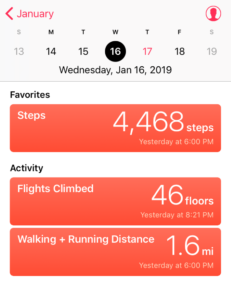







 In December, I turn 50. Along with the ravages that only gravity can inflict comes an acknowledgment: even at the half-century mark, I’m not finished doing the work to emotionally integrate the trauma that happened in my life when I was a kid.
In December, I turn 50. Along with the ravages that only gravity can inflict comes an acknowledgment: even at the half-century mark, I’m not finished doing the work to emotionally integrate the trauma that happened in my life when I was a kid. I’m also reading Bessel van der Kolk’s groundbreaking book
I’m also reading Bessel van der Kolk’s groundbreaking book  It’s one sleep since the end of
It’s one sleep since the end of  How ‘bout that gene testing? Is 23andMe setting itself up to be a next-wave health diagnosis and treatment tool? It’s certainly been a discovery process for me, once
How ‘bout that gene testing? Is 23andMe setting itself up to be a next-wave health diagnosis and treatment tool? It’s certainly been a discovery process for me, once 
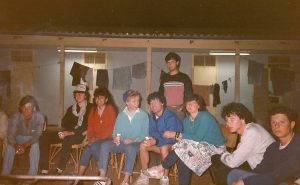



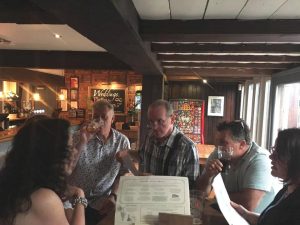


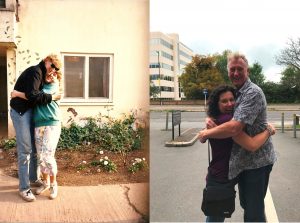






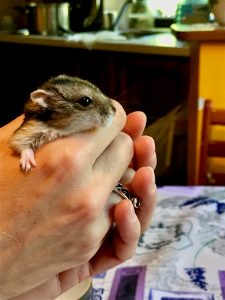


















 I found a really compelling post from Danielle LaPorte in my inbox yesterday called
I found a really compelling post from Danielle LaPorte in my inbox yesterday called  One thing that strikes me as a large factor in courageous-move-making is TIMING. Sometimes it takes a while – three months, three years – to plan a big change. Sometimes you can only juggle one change at a time, and so other things get backburnered while you replant your feet and get steady (or steadier) again. The key is to keep what you want (to risk or change) on your radar. Don’t backburner it on your neighbor’s stove so that you lose sight of it, and start taking small steps toward it, even if you’re not ready to swing the whole deal.
One thing that strikes me as a large factor in courageous-move-making is TIMING. Sometimes it takes a while – three months, three years – to plan a big change. Sometimes you can only juggle one change at a time, and so other things get backburnered while you replant your feet and get steady (or steadier) again. The key is to keep what you want (to risk or change) on your radar. Don’t backburner it on your neighbor’s stove so that you lose sight of it, and start taking small steps toward it, even if you’re not ready to swing the whole deal. Finally, whatever you decide to do, or not do, when it comes to risk-taking and change, BE TRUE TO YOU. Some people fly on the safe side, and will always do so, and if your feelings are telling you it’s all good, then it’s all good. I remember going through a
Finally, whatever you decide to do, or not do, when it comes to risk-taking and change, BE TRUE TO YOU. Some people fly on the safe side, and will always do so, and if your feelings are telling you it’s all good, then it’s all good. I remember going through a